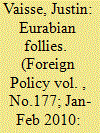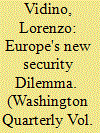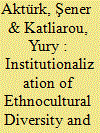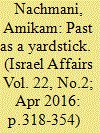|
|
|
Sort Order |
|
|
|
Items / Page
|
|
|
|
|
|
|
| Srl | Item |
| 1 |
ID:
093803


|
|
|
| 2 |
ID:
090948


|
|
|
|
|
| Publication |
2009.
|
| Summary/Abstract |
After the September 11, 2001, attacks, governments throughout the world rushed to improve their counterterrorism policies. Several countries tightened legislation, increased resources available to their intelligence and law enforcement agencies, and established repressive policies to uncover and prosecute terrorist networks. Policymakers, fearing an imminent attack, understandably focused their attention on aggressive methods. Yet, over the last few years, many governments have started thinking about more nuanced, comprehensive, and long-term counterterrorism policies, understanding that simply trying to dismantle terrorist networks is like playing a never-ending game of "whack-a-mole," unless steps are also taken to prevent the radicalization of scores of potential new militants.
|
|
|
|
|
|
|
|
|
|
|
|
|
|
|
|
| 3 |
ID:
178975


|
|
|
|
|
| Summary/Abstract |
We seek to explain variation in the descriptive representation of Muslim minorities in national legislatures, relying on an original data set that includes 635 seats filled by Muslim-origin MPs in the lower chambers of national parliaments of twenty-six European polities in three legislative cycles between 2007 and 2018. We argue that the image of a polity as a union of multiple ethnocultural groups, reflected in concrete state policies and institutional arrangements, may be conducive to better descriptive representation of Muslim minorities, who were not originally envisioned as one of the communities constituting the nation. The results of multivariate regression analysis provide support for our hypothesis that the extent to which ethnocultural diversity is recognized and institutionalized helps explain variation in the levels of descriptive representation of European Muslims. We supplement our findings with congruence testing in four brief case studies: Belgium, France, the Netherlands, and Bulgaria.
|
|
|
|
|
|
|
|
|
|
|
|
|
|
|
|
| 4 |
ID:
110961


|
|
|
|
|
| Publication |
2012.
|
| Summary/Abstract |
In the post 9/11 context new forms of governance of Muslims based on the resurfacing of old colonial ideas have emerged. Micro-surveillance measures involving the hyper-legalization of settled Muslim populations in Western Europe have led to a curtailment of rights through legal measures and political discourses. A new form of governmentality identifies signs of religious belief, such as the hijab, as a potential threat to national identity and security. Operating through a combination of legal mechanisms and popular narratives based on themes associated with colonial governance, Muslims have been 'cast out' of law and politics. With decolonization, this narrative has been transformed into one about a 'home-grown' alien force whose transnational attachments, thought to be evident in a refusal to confine religious identity to the private sphere, are presented as a risk that needs to be contained. European Muslims have rebelled against their removal from the protection of the law by declaring their rights as citizens and as humans as a way of combating religious and cultural discrimination. Historically, human rights have emerged out of processes of containment and exclusions. Today, a new generation of Muslims has appropriated the language of rights to protest against these exclusions, holding the mirror up to the transgressors of human rights: their original proponents. This is a case of 'realized citizenship' in which European Muslims gain access to and mobilize resources and skills to bridge the gap between the promise of citizenship and human rights.
|
|
|
|
|
|
|
|
|
|
|
|
|
|
|
|
| 5 |
ID:
144673


|
|
|
|
|
| Summary/Abstract |
Various factors shape European and Muslim migrant relations; one of these is European‒Jewish and European‒Israeli precedents. Hitherto, this factor has not been thoroughly discussed. This article focuses on the use of recent and past histories, by all sides, when describing present and future relations between the European majority and Muslim migrant minority. This discourse often makes reference to European Jewry as a guiding precedent, as well as to Israeli Middle Eastern policies. As a result, a meaningful triangle has been formed, whose sides consist of Europeans, Muslim immigrants and Jewish communities. The shared issues between them include the painful record of European‒Jewish relations and its implications for the European‒Muslim encounter; the Holocaust; the European Right, its agendas concerning Jews, Muslim immigration and its surprising contacts with the State of Israel; European restrictions against Muslim and Jewish worship and religious rites; among others. Repeatedly, the Muslim issue in Europe is referred to as the Continent’s ‘new Jewish problem’. Moreover, the contemporary integration experience of Muslim migrants in Europe is compared to that of Jews in earlier ages.
|
|
|
|
|
|
|
|
|
|
|
|
|
|
|
|
| 6 |
ID:
169906


|
|
|
|
|
| Summary/Abstract |
Why do Westerners become foreign fighters in civil conflicts? We explore this question through original data collection on German foreign fighters in Syria and Iraq, and test three sets of hypotheses that revolve around socioeconomic integration, online radicalization, and social network mobilization. We conduct link analysis to map the network of German foreign fighters prior to their mobilization, and marshal evidence to assess the validity of competing explanations. We find only modest support for the integration deficit hypothesis, and meager support for the social media radicalization theory. Instead, the preponderance of evidence suggests that interpersonal ties largely drive the German foreign fighter phenomenon. Recruitment featured clustered mobilization and bloc recruitment within interconnected radical milieus, leading us to conclude that peer-to-peer networks are the most important mobilization factor for German foreign fighters.
|
|
|
|
|
|
|
|
|
|
|
|
|
|
|
|
|
|
|
|
|